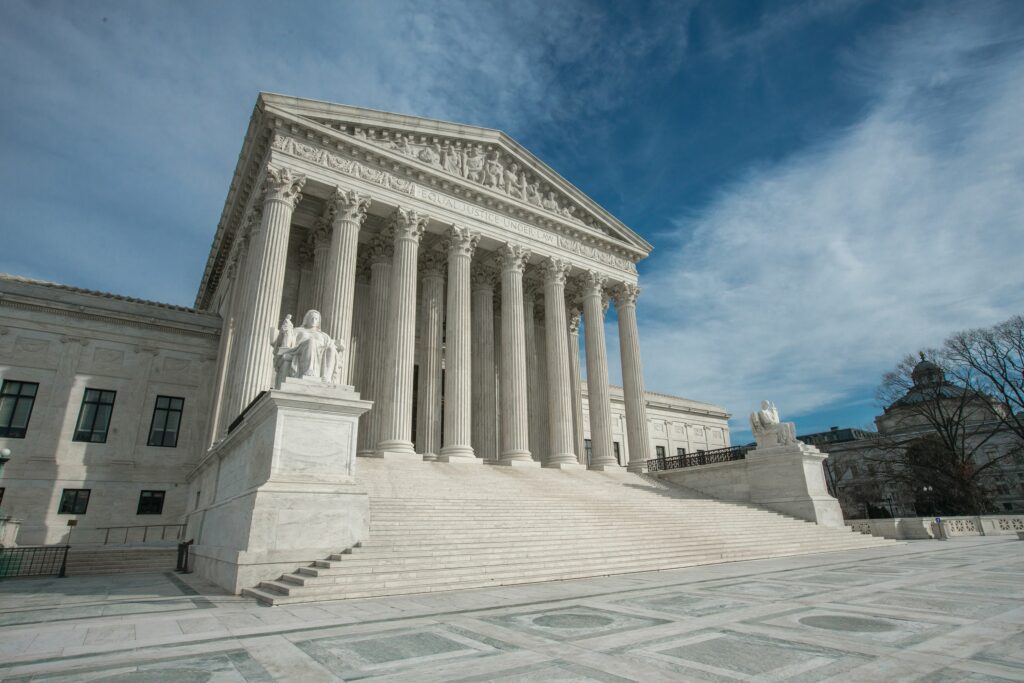The fundamental aspect of the American order has always been our capacity to explore the reality of God and live in line with our convictions. There’s no other country where the safeguarding of religious liberty is so firmly established. James Madison characterized it as a right that cannot be taken away. This right, recognized by the Declaration of Independence, is seen as a gift “endowed by [our] Creator”. The Constitution, along with other legal measures, mirrors the significance of religious freedom in the United States.
The liberty to adhere to a wide range of religious views has fostered a peaceful coexistence, enabling people of various faiths to live, work, educate, and practice their religion side by side. Any endeavor to stifle our right to worship, educate, and express our beliefs not only infringes upon human dignity but also undermines the fundamental principles that form the bedrock of America’s strength.
- What is religious freedom?
- Who benefits from religious freedom?
- What are the consequences of restricting religious freedom?

1. What is religious freedom?
Religious liberty safeguards the rights of individuals to live, communicate, and behave in harmony with their beliefs, both privately and publicly. It ensures they can stay true to themselves in their professional lives, educational settings, and social events. Religious liberty extends beyond the mere “freedom to worship” in places like synagogues, churches, or mosques. It provides a guarantee that they won’t be compelled to compromise their fundamental values and beliefs to fit into societal norms or government mandates.

2. Who benefits from religious freedom?
Religious freedom is advantageous to all, treating everyone on an equal footing—be they Christians, Jews, Muslims, agnostics, or atheists. It maintains the unique diversity of America, providing a space where individuals of varying faiths, perspectives, and convictions can coexist peacefully without the apprehension of facing punitive measures from the government.

3. What are the benefits of religious freedom?
Religious freedom is beneficial to individuals and societies alike. For numerous Americans, their connection to God is the cornerstone of their existence, and their faith instills in them virtues such as integrity and accountability that influence their families and local communities. It inspires them to offer voluntary services at places like food banks, shelters for the homeless, schools, and other establishments catering to the needs of the disadvantaged.
An estimated 350,000 religious congregations operate schools, pregnancy resource centers, soup kitchens, drug addiction programs, homeless shelters, and adoption agencies. These serve 70 million Americans each year and the value of their services are estimated at over $44.3 billion annually.
4. What are the consequences of restricting religious freedom?
Limitations on religious freedom can lead to Americans losing their jobs and prevent organizations from offering essential social services to their communities. It also threatens other fundamental rights, including freedom of speech, freedom of assembly, and even economic liberty. Faith-oriented social service providers and educational establishments often hold strong convictions on matters such as marriage, family, and sexuality. Compelling them to surrender these religious tenets would hinder their capacity to serve their communities effectively.

5. Do only individuals enjoy religious freedom protections?
Religious freedom pertains to both individuals and entities, encompassing charities and businesses. When people, driven by significant personal beliefs, come together to operate businesses or charities, the newly formed entity is recognized as a “legal person.” Individuals do not “surrender” their beliefs or rights when they establish an association or venture into business.
The U.S. Supreme Court recently affirmed that the Little Sisters of the Poor (an order of Catholic nuns); Hobby Lobby Stores; and faith-based colleges and universities could not be compelled by the government to pay for abortion-inducing drugs and devices in violation of their religious beliefs.
6. Should people of faith be forced to change a particular religious belief to conform to changing opinions or laws?
Absolutely not. The government shouldn’t engage in monitoring religious ideologies. Many religious doctrines are built on the notion that truth is everlasting and constant. Demanding that these beliefs adapt to incorporate evolving societal norms contradicts the core of their convictions. Dictating particular religious concepts and behaviors for all citizens also undermines the freedom of conscience, a fundamental principle upon which our nation was established. Each individual possesses the liberty to uphold their unique religious perspectives.
The Supreme Court rejected the idea that the U.S. government should compel any citizen to adopt an official belief in West Virginia State Board of Education v. Barnette:
“If there is any fixed star in our constitutional constellation, it is that no official, high or petty, can prescribe what shall be orthodox in politics, nationalism, religion, or other matters of opinion or force citizens to confess by word or act their faith therein.”
7. Religious people can believe whatever they want and worship however they want. Why do they have to bring their beliefs into the public square?
Whether religious or secular, most individuals strive to lead lives marked by integrity, aligning their actions with their convictions. They should not be compelled to feign a different persona simply due to their professional or voluntary roles. Followers of Judaism, Christianity, and Islam all acknowledge that their faith should be openly practiced at school, at work, and in public. Freedom of religion safeguards not just an individual’s beliefs, but also their right to act in accordance with those beliefs.

8. Isn’t this just creating special rights for religious believers?
Absolutely not. Religious freedom acts as a barrier, preventing the dominant cultural group from leveraging state power to enforce their beliefs on others. This safeguards all individuals—both religious and nonreligious—from a government so mighty that it dictates people’s thoughts and actions. The right to one’s conscience is the most sacrosanct personal liberty. A government that infringes upon the freedom of conscience will likely not hesitate to encroach upon other liberties.
9. Doesn’t religious freedom allow people to do whatever they want under the cover of religion?
Certainly not. The federal government may impose limits on religious freedom only when it is vitally essential to foster justice and safeguard the common good. To justify such limitations, the government must demonstrate a “compelling interest” and that its approaches are narrowly designed. This standard curbs the government’s power to restrict religious freedom beyond what is needed to protect individuals, and it prevents potential harm to others under the pretext of religion. For instance, a man cannot evade punishment for abusing his family by asserting that his religious beliefs prompted his actions; religious freedom does not provide protection in such cases.

10. Aren’t there a lot of cases out there involving businesses using religious freedom arguments to refuse service to LGBT people?
Certainly not. The business owners in these instances are more than willing to serve and hire everyone, encompassing individuals who identify as LGBT. They cater to all individuals but are unable to convey all messages. They can’t produce bespoke art that commemorates events or communicates messages that contradict their own religious beliefs, as doing so would betray their faith. No individual should face personal or professional ruin for refusing to comply with a prevailing cultural standard. A government that has the power to coerce a creative professional into endorsing same-sex marriage possesses the capacity to compel anyone to affirm concepts and messages that are in conflict with their beliefs.
Under our Constitution, “esthetic and moral judgments about art and literature are for the individual to make, not for the Government to decree, even with the mandate or approval of a majority.”
11. Is religious freedom a “license to discriminate” that will lead back to Jim Crow laws?
Certainly not. Jim Crow represented a system of legally enforced segregation grounded in the notion of racial superiority. These laws constrained economic markets and barred pro-desegregation businesses from serving African Americans. The government had to enact public accommodation laws to protect African Americans from pervasive discrimination that systematically deprived them of basic needs. On the other hand, same-sex couples today have numerous avenues to procure the goods and services they desire, inclusive of custom art for their weddings. However, there exist some service providers who, while open to all customers, cannot communicate every message, particularly those inconsistent with their belief in the traditional definition of marriage as a union between a man and a woman.

12. Is opposition to same-sex marriage rooted in the same type of prejudice as opposition to interracial marriage?
Indeed, no. The Supreme Court, in the landmark case of Obergefell v. Hodges, made it clear that many individuals who oppose same-sex marriage do so based on “decent” and “honorable” principles. Meanwhile, in Loving v. Virginia, the Court characterized anti-miscegenation laws as a detestable attempt to maintain white supremacy. The conviction that marriage is a union of one man and one woman is anchored in the understanding that men and women complement each other and that children ideally need both a mother and a father. Conversely, the notion that marriage should not occur between individuals of different races is ingrained in the abhorrent, dishonorable, and immoral ideology of racism. To equate these two sets of beliefs is both an intellectual dishonesty and a distortion of historical truth.
Footnotes:
- Brian J. Grim and Melissa E. Grim, “The Socio-economic Contribution of Religion to American Society: An Empirical Analysis,” Interdisciplinary Journal of Research on Religion, Vol. 12, Art. 3 (2016), http://faithcounts.com/report/ (accessed March 19, 2018).
- John Corvino, Ryan T. Anderson, and Sherif Girgis, Debating Religious Liberty and Discrimination (New York: Oxford University Press, 2017), p. 109.
- See Zubik v. Burwell, 136 S. Ct. 1557 (2016); Burwell v. Hobby Lobby, 134 S. Ct. 2751 (2014).
- Brief of Amici Curiae Ethics & Religious Liberty Commission of the Southern Baptist Convention; Christian Life Commission of the Missouri Baptist Convention; John Paul the Great Catholic University; Oklahoma Wesleyan University; Spring Arbor University; William Jessup University; American Association of Christian Schools; Jews for Religious Liberty; and Imam Omar Ahmed Shahin in Support of Petitioners, Masterpiece Cakeshop v. Colorado Civil Rights Commission, Supreme Court of the United States, No. 16-111, September 7, 2017, https://www.americanbar.org/content/dam/aba/publications/supreme_court_preview/briefs-2017-2018/16-111-amicus-pet-ethics-religious-liberty-commission-of-the-southern-baptist-convention-et-al.authcheckdam.pdf (accessed March 19, 2018).
- Brief of Amici Curiae Ethics & Religious Liberty Commission of the Southern Baptist Convention; Christian Life Commission of the Missouri Baptist Convention; John Paul the Great Catholic University; Oklahoma Wesleyan University; Spring Arbor University; William Jessup University; American Association of Christian Schools; Jews for Religious Liberty; and Imam Omar Ahmed Shahin in Support of Petitioners, Masterpiece Cakeshop v. Colorado Civil Rights Commission, Supreme Court of the United States, No. 16-111, September 7, 2017, https://www.americanbar.org/content/dam/aba/publications/supreme_court_preview/briefs-2017-2018/16-111-amicus-pet-ethics-religious-liberty-commission-of-the-southern-baptist-convention-et-al.authcheckdam.pdf (accessed March 19, 2018).
- United States v. Playboy Entertainment Group, Inc., 592 U.S. 803, 818 (2000).
- Compare Obergefell v. Hodges, 135 S. Ct. 2584, 2602 (2015) (“Many who deem same-sex marriage to be wrong reach that conclusion based on decent and honorable religious or philosophical premises, and neither they nor their beliefs are disparaged here.”) and id. at 2594 (“This view long has been held—and continues to be held—in good faith by reasonable and sincere people here and throughout the world.”) with Loving v. Virginia, 388 U.S. 1, 11 (1967) (denouncing anti-miscegenation laws as “measures designed to maintain White Supremacy”).

